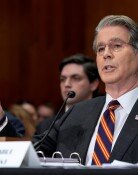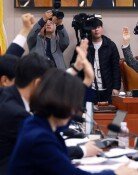Top Executives Take Responsibility for Accounting Fraud
Top Executives Take Responsibility for Accounting Fraud
Posted May. 30, 2004 22:45,
The court sided with individual investors and ordered the executives of the insolvent Daewoo to compensate damages. The courts decision is very meaningful in that it once again acknowledged civil liability of top executives involved in accounting fraud.
The Daewoo group had been involved in 49.09 trillion won worth of window-dressing for three years since 1997 by the order of former chairman Kim Woo-jung. Then, with the fraudulent books, it borrowed ten trillion won from financial institutions.
The Financial Supervisory Service (FSS) and the Prosecution started an investigation in 2000 and revealed the fraud in February of 2001.
Individual investors filed a series of lawsuits against five affiliates, including Daewoo Corporation, Daewoo Motors, Daewoo Heavy Industries, Daewoo Electronics and Daewoo Communications.
Six cases of damage claims against Daewoo affiliates, executives and two accounting firms were filed by 524 shareholders in October 2000. Before that, Peoples Solidarity gathered shareholders and filed for damages worth 24 billion won against Kim Woo-jung in 1999, but the trial has been postponed as the chairman left the country.
The Korea Deposit Insurance Corporation (KDIC) revealed in September 2002 that the chairman, 49 former and present executives and four accounting firms incurred financial losses of about 4.27 trillion won in Daewoo affiliates. The KDIC notified financial institutions that extended credit to the affiliates to claim damages against Kim, and the related lawsuits are now underway.
Individual investors have lodged about 40 civil cases regarding Daewoo accounting fraud, and the amount claimed is around 600 billion won. Several cases among them were decided in favor of the plaintiffs in the first ruling.
The courts decision is likely to accelerate the proceedings of the pending civil lawsuits because criminal cases involving the prosecuted former and present executives are awaiting the Supreme Courts final decision. With Daewoos filing of an unconstitutionality suit against the Securities Exchange Act being ruled constitutional, the remaining obstacles to trials have almost been addressed.
It is, however, unlikely that the financial institutions or individual investors can recover all of their damages even if they win the cases. The accounting firms that audited Daewoo group have already closed down, and Daewoo affiliates are freed from the responsibility, as they have been split up.
The prosecuted executives were sentenced to pay 24 trillion won by the appellate court.
Nevertheless, even if they receive punishment from the Supreme Court, compensation is almost impossible given their solvency situation.
Tae-Hoon Lee jefflee@donga.com







